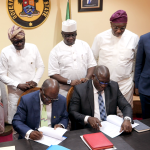Nigeria will continue to borrow to fund 2017 budget-Adeosun
Nigeria will continue to borrow to fund 2017 budget-Adeosun
NIGERIA will continue to borrow to fund its budget for 2017, the finance ministry said in a statement on Thursday, after the finance minister said on Tuesday Africa’s largest economy “cannot borrow anymore”.
Finance Minister Kemi Adeosun’s comments had raised questions about how Nigeria would fund its budget for the year and about planned foreign loans of $2 billion from lenders like the World Bank.
Africa’s largest economy is in its first recession in 25 years, and it had planned to borrow extensively from overseas to fund a record budget aimed at helping the country spend its way out of its economic doldrums.
“We have headroom to borrow and are doing so aggressively in the short to medium term in order to address our infrastructure deficit and to stimulate growth,” Thursday’s statement said.
“At the same time, it is vital that Nigeria diversifies its revenue base and builds its revenue profile,” it said. That would “ensure that we do not continue to overly rely on debt to fund our budget spending over the long term.”
To reduce the need for debt, the finance ministry is trying to increase Nigeria’s tax collection revenues. It hopes to raise at least $1 billion from a scheme that will give tax evaders a chance to make payments retroactively.
Economists have long criticised the low levels of tax in Nigeria, and in March the Abuja government laid out plans to increase the overall of tax to gross domestic product to 15 percent by 2020 from 6 percent now.
Nigeria’s presidency signed off on its N7.44 trillion ($24.39 billion) budget for 2017 in June, after numerous delays.
The plan projects a deficit of N2.21 trillion, implying a deficit equivalent to 2.18 percent of Nigerian GDP.





Leave a Reply